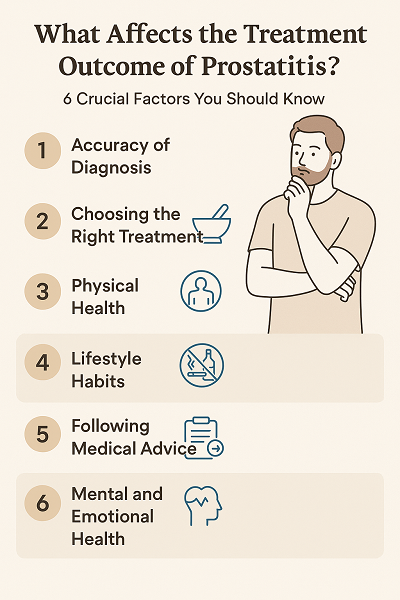What Affects the Treatment Outcome of Prostatitis? 6 Crucial Factors You Should Know
Prostatitis, a common yet often misunderstood condition in men, can be frustrating to treat. Many patients spend months—or even years—trying different medications, therapies, and remedies, only to find limited or temporary relief. But why is it so difficult to fully recover from prostatitis?
The answer lies in multiple influencing factors. Prostatitis is not a one-size-fits-all condition, and its treatment outcome depends on a combination of medical, personal, and lifestyle elements. Whether you're newly diagnosed or have been battling chronic symptoms, understanding these factors can help you take back control and move toward long-term recovery.

Here are six key aspects that can significantly affect your prostatitis treatment outcome—and what you can do to improve it.
1. Accuracy of Diagnosis: Don't Skip the First Step
Effective treatment starts with knowing exactly what you're dealing with. Prostatitis symptoms—such as pelvic pain, urinary frequency, discomfort during ejaculation, or perineal pressure—can mimic other urological conditions, including urinary tract infections, benign prostatic hyperplasia (BPH), or even sexually transmitted infections.
Without a precise diagnosis, you may be treating the wrong condition altogether. A proper diagnostic workup should include:
- Urinalysis and urine culture
- Prostatic secretion tests
- Transrectal ultrasound or pelvic imaging
- History of symptoms and physical examination
Only with clear diagnostic results can your doctor recommend the most suitable treatment path.
2. Choosing the Right Treatment: It's Not Always Antibiotics
Antibiotics are the go-to option for bacterial prostatitis, but many cases—especially chronic ones—are not caused by bacteria. Unfortunately, repeated use of antibiotics in nonbacterial cases can lead to drug resistance and even worsen the condition over time.
That's where natural treatments, like the Diuretic and Anti-inflammatory Pill, come into play.
This herbal formula developed by Dr. Lee's TCM Clinic has been widely used to manage chronic nonbacterial prostatitis, pelvic pain, and inflammation. It works by:
- Promoting blood circulation
- Eliminating pathogenic heat and dampness
- Reducing swelling and inflammation
- Improving urinary and reproductive function
Unlike antibiotics or invasive procedures, this natural remedy focuses on treating the root cause of prostatitis without disrupting gut flora or causing harmful side effects. It's particularly suitable for patients with chronic pelvic pain syndrome or those who have seen little improvement with conventional medicine.
3. Your Physical Health Matters More Than You Think
Your overall health condition plays a vital role in how well you respond to prostatitis treatment. Patients with underlying conditions—such as diabetes, obesity, hypertension, or immune disorders—may experience delayed healing, lower drug efficacy, or persistent symptoms.
Additionally, factors like age, hormone levels, metabolic rate, and even digestive health can influence how your body responds to therapy.
That's why personalized treatment is essential. Your doctor should evaluate your full health profile and tailor a plan that includes medications, supplements, diet, and rest. Holistic treatments like the Diuretic and Anti-inflammatory Pill often offer better results for patients with complex or long-standing conditions, because they support the body's natural healing mechanisms.
4. Lifestyle Habits: A Hidden Enemy or Your Strongest Ally
Even the best treatment plan can be sabotaged by poor lifestyle choices. If you spend hours sitting every day, drink heavily, smoke, eat poorly, or engage in unprotected or excessive sexual activity, you're setting yourself up for failure.
Here are some lifestyle changes that can enhance treatment:
- Avoid prolonged sitting; take breaks to stand and stretch
- Stay hydrated and avoid spicy, greasy foods
- Quit smoking and limit alcohol
- Maintain regular but moderate sexual activity
- Engage in light exercise such as walking or yoga
Many users of the Diuretic and Anti-inflammatory Pill have reported faster symptom relief when they combined the treatment with healthy lifestyle adjustments. Herbal medicine works best when the body is in balance, so don't underestimate the power of these changes.
5. Following Medical Advice: Compliance Is Key
Non-compliance is a silent killer of treatment success. Whether you're on antibiotics, herbal pills, or undergoing physical therapy, failing to follow your doctor's instructions can lead to treatment failure, worsening symptoms, or the need for more aggressive interventions.
That includes:
- Taking medication on time and at the right dosage
- Completing the full course of therapy even if symptoms improve
- Attending follow-up appointments
- Being honest about changes in your condition
Many patients who use the Diuretic and Anti-inflammatory Pill see optimal results after three to six weeks of continuous use, depending on the severity of their condition. Skipping doses or stopping prematurely can reduce its effectiveness.
6. Mental and Emotional Health: Don't Ignore the Psychological Side
Living with chronic prostatitis can be emotionally draining. Many patients experience anxiety, depression, low libido, and even relationship problems due to their symptoms. Unfortunately, stress can make your condition worse by tightening pelvic muscles and increasing inflammation.
If you feel overwhelmed, talk to your doctor or a counselor. Relaxation techniques like meditation, mindfulness, or even gentle pelvic floor yoga can help. Support from partners, family, or fellow patients can also provide emotional stability, which contributes to better physical healing.
Conclusion: Holistic Understanding for Better Healing
Prostatitis is a complex condition that doesn't respond well to a one-size-fits-all approach. Effective management requires:
- A clear and accurate diagnosis
- Choosing the right therapy (not just antibiotics)
- Improving overall health
- Making smart lifestyle choices
- Sticking to the treatment plan
- Maintaining a positive mindset
For those struggling with chronic prostatitis, the Diuretic and Anti-inflammatory Pill offers a natural, comprehensive solution that targets both symptoms and root causes. When combined with proper care and healthy habits, it may be the breakthrough you've been looking for.



